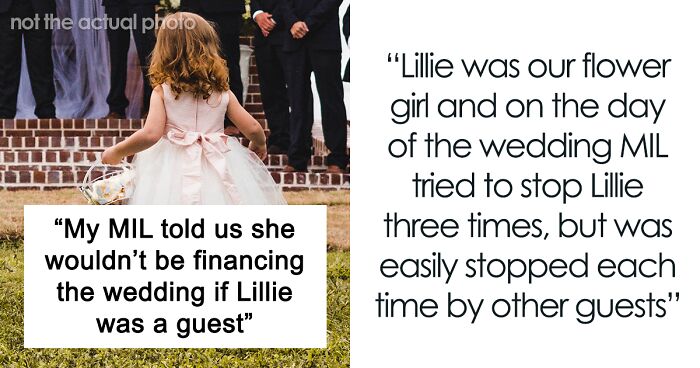
“Monster-In-Law Excludes My Oldest, So I Exclude Her”: Mom Gets Petty Revenge On MIL
Interview With ExpertFamilies come in all shapes and sizes. Although that can be a beautiful thing, it often also comes with lots of complexities. For example, some grandparents might have difficulty accepting children from previous partnerships as their own grandchildren. And because mothers have the instinct to protect their children, the relationship between an MIL and a DIL might become strained.
Redditor Fancy-Atmosphere-221 ended up in a similar situation. She shared a story on r/pettyrevenge about how she got back at her mother-in-law for treating her eldest daughter as a second-class grandchild. Read on to find out the whole story and how the Internet reacted to OP’s petty revenge.
Bored Panda sought some expertise on this family issue. Clinical psychologist Thai Alonso, Ph.D., kindly agreed to comment on the situation. You can find her insights below!
More info: Dr. Thai Alonso, PhD | Instagram
Not all grandparents love their grandchildren equally
Image credits: Anna Shvets (not the actual photo)
This woman decided to take revenge on her MIL for not treating her eldest daughter like her other children
Image credits: Andrea Piacquadio (not the actual photo)
Image credits: Maryia Plashchynskaya (not the actual photo)
Image credits: Fancy-Atmosphere-221
Parents have a lot of responsibility to a child that might feel mistreated by one of their grandparents
Thai Alonso is a clinical psychologist whose fields of expertise include parenting, relationships and self-esteem. She says that the situation that OP described is incredibly hurtful, especially for the child.
“It is crucial that both parents are aligned about what boundaries they will be putting in place and how they will be going about it,” the psychologist says. “Without this, there is a lot of opportunity for marital and family conflict that will very likely trickle down and affect the children.”
Alonso says that adults sometimes underestimate how perceptive children can be. “It is incredibly painful for a child to not receive the same kind of attention and love as their siblings. Especially when it is from a close family member like a grandparent.”
If the above-described situation occurs, the child may wonder what role their parents might have played in it. Alonso suggests possible thoughts that might run through the child’s mind: “Did my parents notice this difference in treatment and condone it?” Or “Did my parents notice this difference and take action to support me?”
“As parents, it is our job to protect our children from harm,” the psychologist emphasizes. “This requires us to first assess the risk or harm and then take action. These actions can range anywhere from having a developmentally appropriate conversation with the child about the child’s expressed concerns, validating their experiences and letting them know it is not their fault, to limiting the time a relative spends with the children.”
Image credits: Andrea Piacquadio (not the actual photo)
Parents should view their child as an active participant in this situation
Alonso says parents should prioritize how the child is feeling and acting. “It is important to understand the child’s experience from their point of view. Ask them how they feel about their relationships with the person in question. What do they enjoy? What do they not enjoy? What is it like for them to spend time together?”
The family therapist says it’s okay to ask the child “How can I help you with this?” “Having these conversations with your child helps them know that you care about their experience and that you are a safe space for them to share their feelings and concerns,” Alonso tells Bored Panda.
Should parents let the relationship between the child and the grandparent continue in this context? “Prioritizing a child’s well-being may also include supervising interactions, limiting time together, and/or structuring events to maximize positive interactions,” Alonso admits. “It also includes momentarily putting your own feelings aside and discussing these with another adult – not your child.”
Image credits: Anna Shvets (not the actual photo)
Related by blood or not, children should feel loved and cherished in a family
The term ‘blended family’ (sometimes also called a stepfamily) refers to families where parents have one or more children from a previous relationship. In this particular story, the grandmother’s real problem seems to stem from the fact that the girl is not her blood relative.
Dr. Alonso concludes that while such a situation is extremely hurtful, ultimately it’s not about family ties and blood relatives. “I am not sure how common this specific situation is,” the doctor says, “but what is most concerning is the blatant disregard for a child (blood or not) and for one’s adult child who has made the choice to become the parent of this child.”
Instead of trying to change the way the grandmother thinks, the parents should focus on things they can change. “We cannot force someone to have affection and consideration for another,” Thai Alonso says. “We cannot force anyone to do anything at all. All we can do is make our wishes known and if we are met with disregard, establish boundaries that protect us and those we care about.”
Image credits: Oană Andrei (not the actual photo)
Commenters had a lot of questions about the situation
People were almost unanimous in criticizing the MIL. Others thought the OP shared in some of the blame, too
I am 63 and a boomer. I NEVER understood people’s hang up about children who aren’t related to them by blood. Who the f**k cares? That child is your child if you are the person who does all the heavy lifting to raise them. Period. Doesn’t matter if you share 100%, 50%, or 0% of your DNA with them, they are your child! You should NEVER stigmatize any child for not sharing DNA with you, ffs. Over the years I have met so many people like that, and over the years it has taken every ounce of self control I have to not kick their asses into next week for spewing that filth.
I agree. I am a Millennial and never understood this. A kid is a kid.
Load More Replies...All this horrible treatment of an 11 year old girl because she's "not blood". MIL is a stone cold b***ch. I'd cut her off from the twins.
"I've never been anything but nasty to your daughter, but I'm offended that you wouldn't let me give a speech on her birthday in front of all her loved ones." It sounds like a recipe for disaster. Think of what she might say!!
Load More Replies...When my daughter met and married the man of her dreams, he already had twins. The first time I met those kids, I asked my future son-in-law if he minded if I called them my grandchildren and he was ecstatic. It's now 18 years later, and they are still my grandchildren.
I am 63 and a boomer. I NEVER understood people’s hang up about children who aren’t related to them by blood. Who the f**k cares? That child is your child if you are the person who does all the heavy lifting to raise them. Period. Doesn’t matter if you share 100%, 50%, or 0% of your DNA with them, they are your child! You should NEVER stigmatize any child for not sharing DNA with you, ffs. Over the years I have met so many people like that, and over the years it has taken every ounce of self control I have to not kick their asses into next week for spewing that filth.
I agree. I am a Millennial and never understood this. A kid is a kid.
Load More Replies...All this horrible treatment of an 11 year old girl because she's "not blood". MIL is a stone cold b***ch. I'd cut her off from the twins.
"I've never been anything but nasty to your daughter, but I'm offended that you wouldn't let me give a speech on her birthday in front of all her loved ones." It sounds like a recipe for disaster. Think of what she might say!!
Load More Replies...When my daughter met and married the man of her dreams, he already had twins. The first time I met those kids, I asked my future son-in-law if he minded if I called them my grandchildren and he was ecstatic. It's now 18 years later, and they are still my grandchildren.

 Dark Mode
Dark Mode 

 No fees, cancel anytime
No fees, cancel anytime 


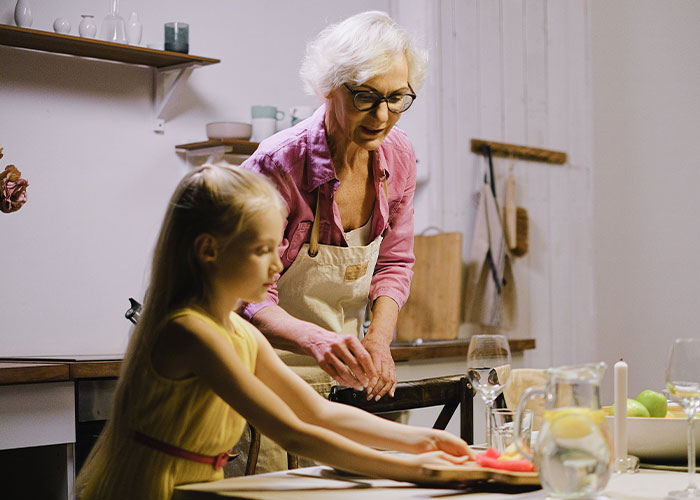
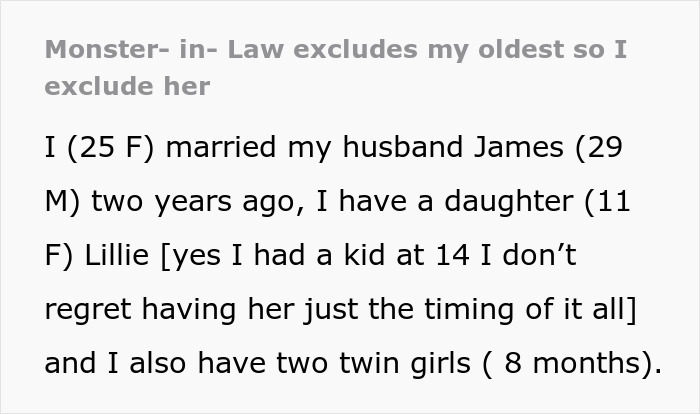
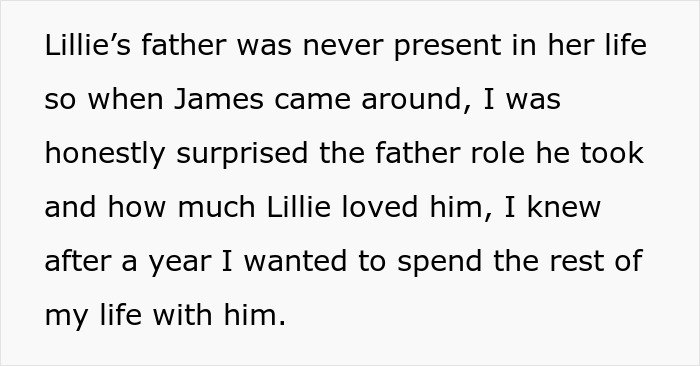
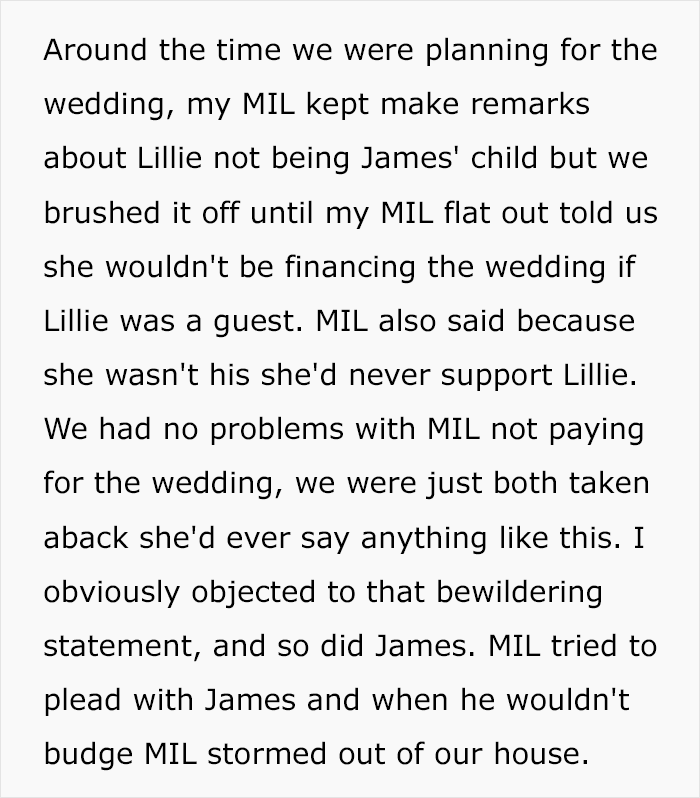

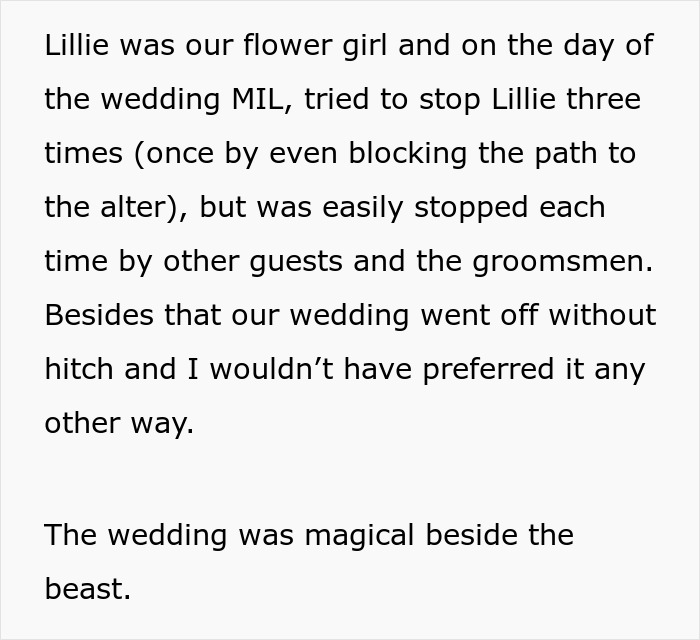

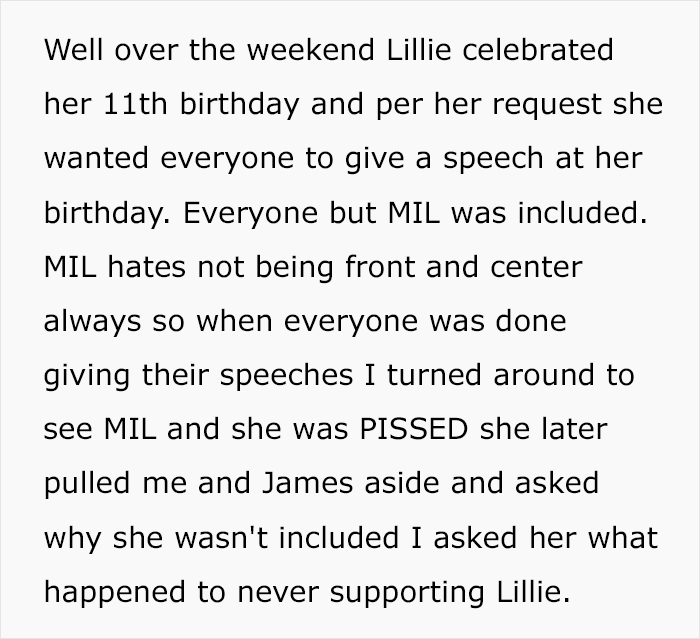
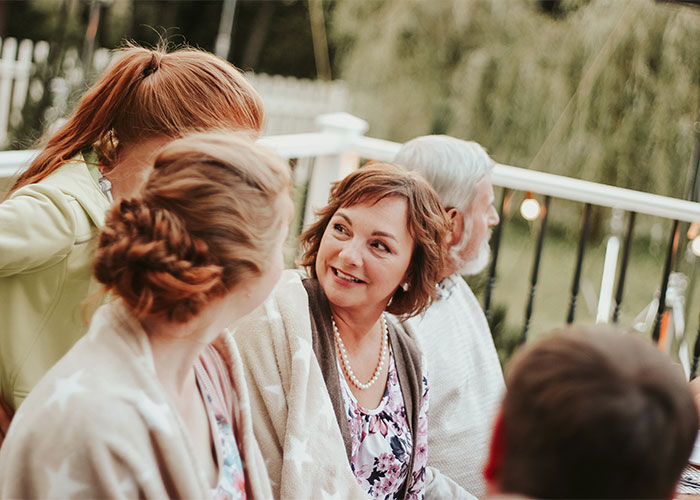
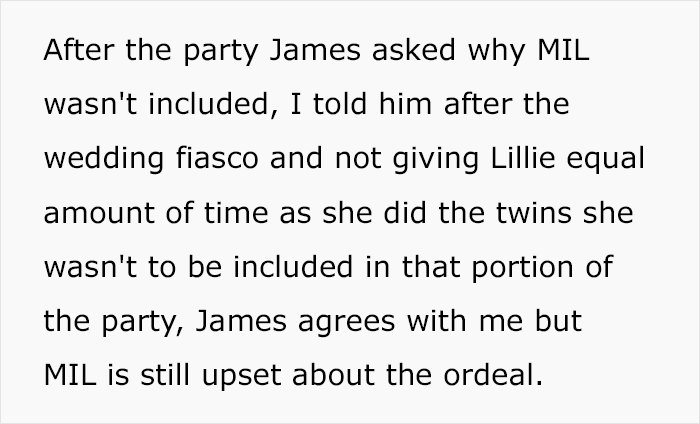

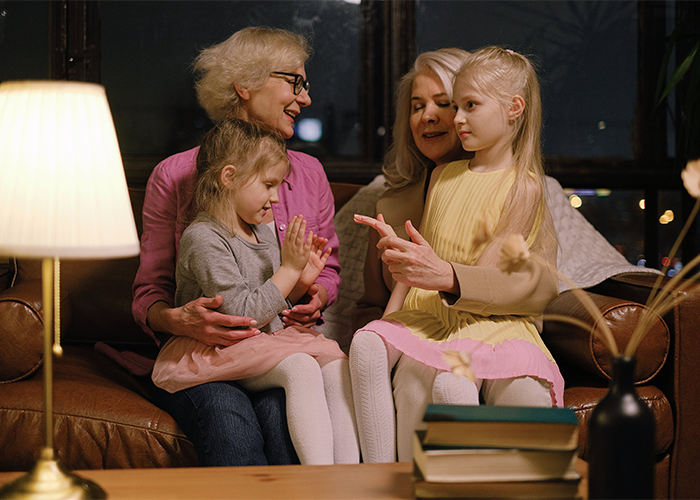

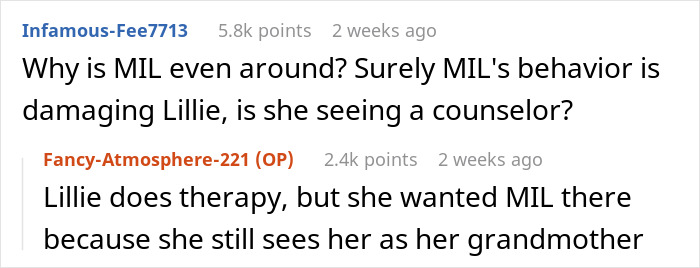
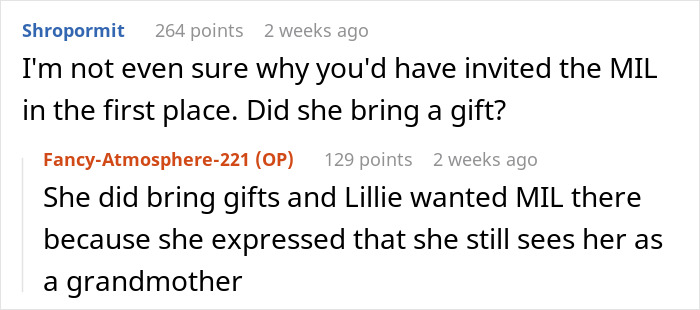
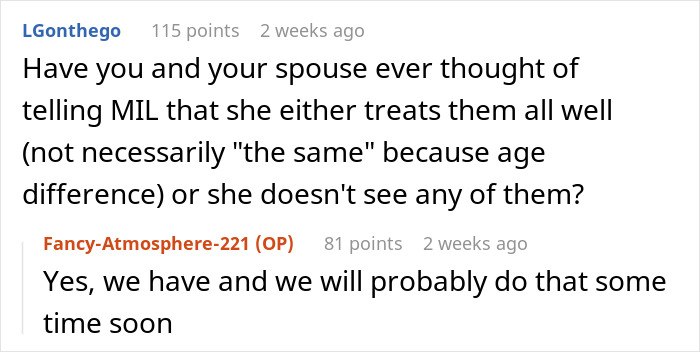
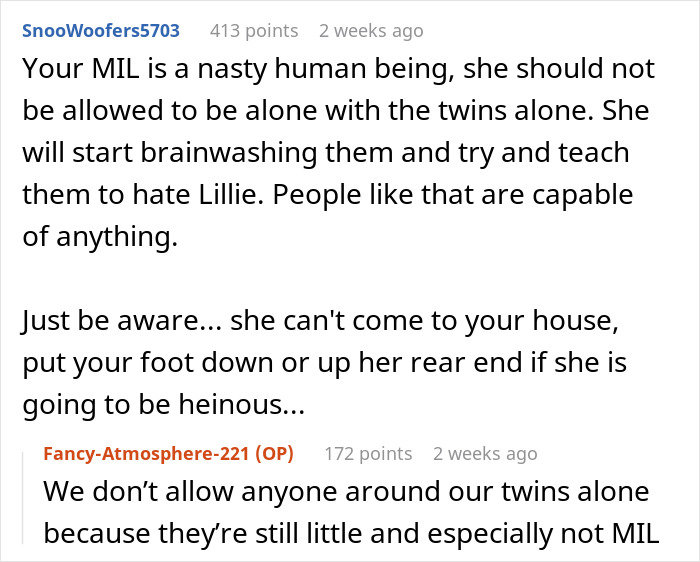
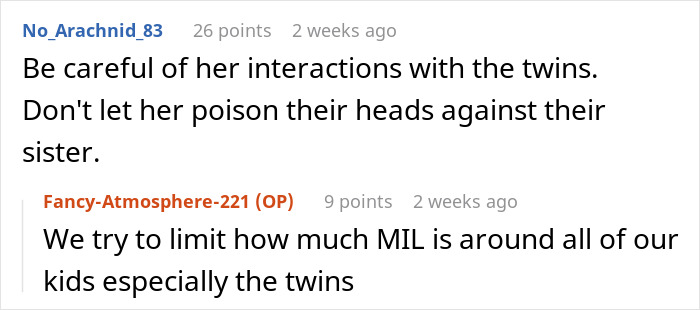
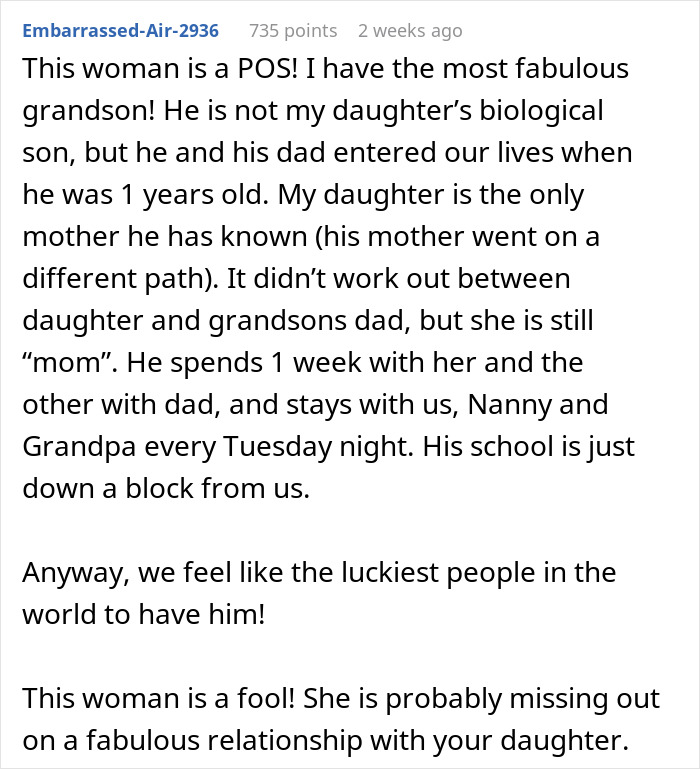

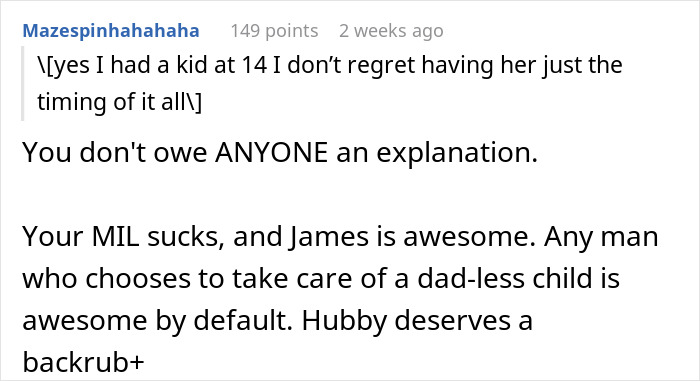


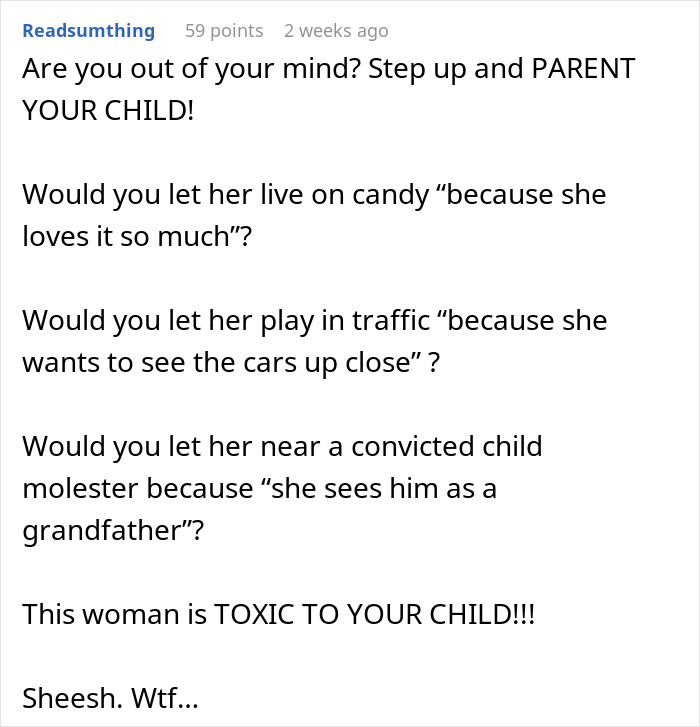



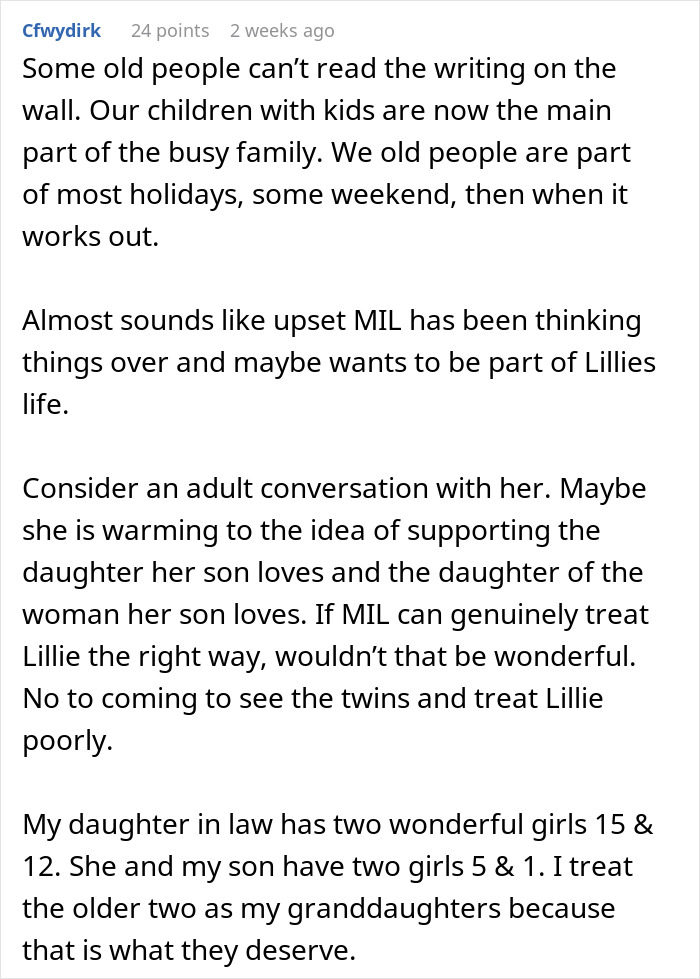



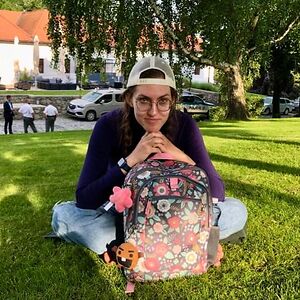









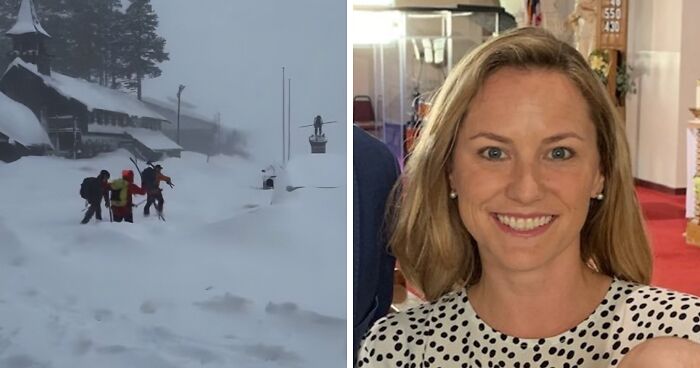

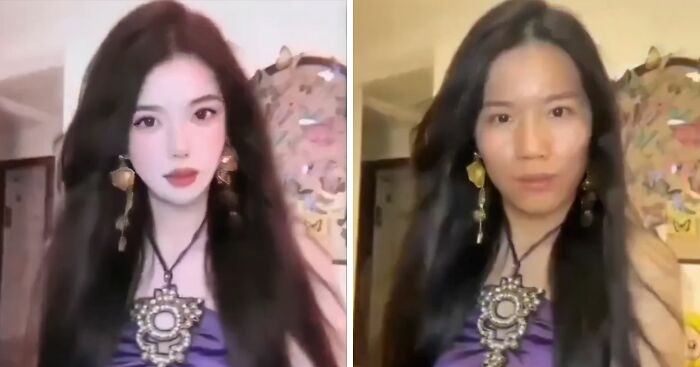
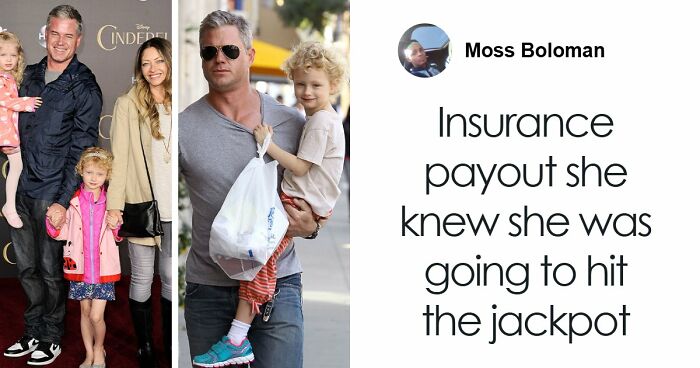






























96
69